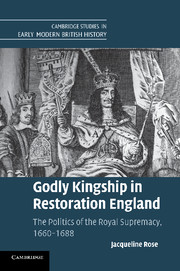Book contents
- Frontmatter
- Contents
- Acknowledgements
- Abbreviations and conventions
- Introduction The Restoration, the Reformation, and the royal supremacy
- Chapter 1 Foundations and legacies: the Reformation and the royal supremacies, 1530–1660
- Chapter 2 The crown and the cavalier Anglicans: prerogative, parliament, and ecclesiastical law
- Chapter 3 Spiritual authority and royal jurisdiction: the question of bishops
- Chapter 4 Dissenters and the supremacy: the question of toleration
- Chapter 5 Anticlericals and ‘Erastians’: the spectre of Hobbes
- Chapter 6 Catholics and Anglicans: James II and Catholic supremacy
- Conclusion
- Bibliography
- Index
Chapter 5 - Anticlericals and ‘Erastians’: the spectre of Hobbes
Published online by Cambridge University Press: 05 July 2011
- Frontmatter
- Contents
- Acknowledgements
- Abbreviations and conventions
- Introduction The Restoration, the Reformation, and the royal supremacy
- Chapter 1 Foundations and legacies: the Reformation and the royal supremacies, 1530–1660
- Chapter 2 The crown and the cavalier Anglicans: prerogative, parliament, and ecclesiastical law
- Chapter 3 Spiritual authority and royal jurisdiction: the question of bishops
- Chapter 4 Dissenters and the supremacy: the question of toleration
- Chapter 5 Anticlericals and ‘Erastians’: the spectre of Hobbes
- Chapter 6 Catholics and Anglicans: James II and Catholic supremacy
- Conclusion
- Bibliography
- Index
Summary
Nonconformists who sought to use the supremacy to restrain or even abolish bishops were often more antiprelatical than anticlerical. They saw godly clergy as having a role in the church (however organised) and some of them clung to the possibility of a godly bishop. Other theorists were more vehemently anticlerical, perceiving sedition coming from Catholic, Presbyterian, and episcopal sources. These men bemoaned ‘priestcraft’, a word which captured fears about the socio-cultural as well as political power of the clergy. The warriors in this anticlerical campaign included some of the most prominent thinkers in seventeenth-century England: John Selden, Thomas Hobbes, John Harrington, and John Locke. It is, therefore, no surprise that when discussing religious ideas, intellectual historians of the period have been prone to write the history of heterodoxy and unbelief.
- Type
- Chapter
- Information
- Godly Kingship in Restoration EnglandThe Politics of The Royal Supremacy, 1660–1688, pp. 203 - 228Publisher: Cambridge University PressPrint publication year: 2011

